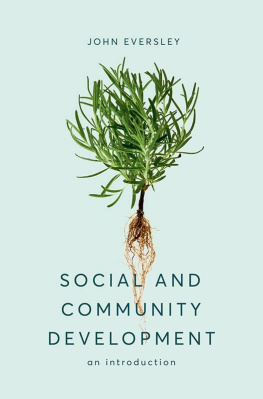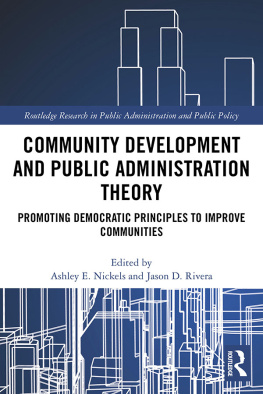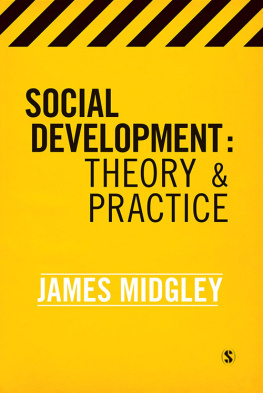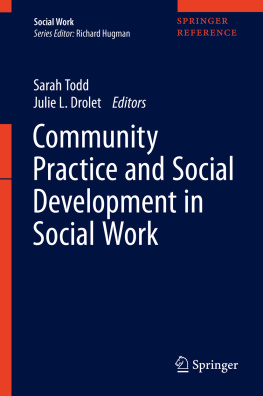SOCIAL AND COMMUNITY DEVELOPMENT
SOCIAL AND COMMUNITY DEVELOPMENT
AN INTRODUCTION
JOHN EVERSLEY

John Eversley, under exclusive licence to Springer Nature Limited 2019
All rights reserved. No reproduction, copy or transmission of this publication may be made without written permission.
No portion of this publication may be reproduced, copied or transmitted save with written permission or in accordance with the provisions of the Copyright, Designs and Patents Act 1988, or under the terms of any licence permitting limited copying issued by the Copyright Licensing Agency, Saffron House, 610 Kirby Street, London EC1N 8TS.
Any person who does any unauthorized act in relation to this publication may be liable to criminal prosecution and civil claims for damages.
The author has asserted his right to be identified as the author of this work in accordance with the Copyright, Designs and Patents Act 1988.
First published 2019 by
RED GLOBE PRESS
Red Globe Press in the UK is an imprint of Springer Nature Limited, registered in England, company number 785998, of 4 Crinan Street, London, N1 9XW.
Red Globe Press is a registered trademark in the United States, the United Kingdom, Europe and other countries.
ISBN 9781137502117 paperback
This book is printed on paper suitable for recycling and made from fully managed and sustained forest sources. Logging, pulping and manufacturing processes are expected to conform to the environmental regulations of the country of origin.
A catalogue record for this book is available from the British Library.
A catalog record for this book is available from the Library of Congress.
To Josephine Klein
CONTENTS
LIST OF FIGURES
LIST OF TABLES
LIST OF BOXES
Introduction
We have experienced directly, witnessed or heard of many situations which we want to change:
Not being treated fairly or being able to fulfil our hopes or potential.
Other people unable to fulfil their potential because of the direct or indirect actions of others, or self-destructive behaviour.
Seeing a child or adult who is abused, bullied or harmed.
Groups of people being blamed, victimised or not getting a fair chance.
Exploitation, harming or letting down the users, customers or workers of institutions such as companies, government agencies and charities through their goods and services or working practices.
Countries and regions at war internally or with other countries, or where lives are lost because of human actions or lack of protection from, or preparation for, natural disasters.
Ideas or slogans that belittle us or other people and which seek to justify brutal or discriminatory treatment.
Beyond asking What can I do?, we may ask Why do these things happen?, What works to change these situations? This book is not an analysis of all these ills or a guide to the campaigns or organisations that seek to cure them. It is not a celebration or an evaluation of interventions. I have spent 40 years directly involved in trying to change some of these situations and teaching and researching with many more people who have been activists and practitioners. The book is a reflection on what should be the underlying principles of community or social development, and how they can be turned into practice.
The book is intended as an introduction for students and practitioners to an activity which they may see as part of a profession, as a paid job or as something they will do as a volunteer or an activist.
My central argument is that social change starts inside individuals and individual change often begins with social change. They are both achieved by people learning from each other, not a one-way process. Writing a book for people to absorb a single authors knowledge and ideas might seem to contradict this. Two very different commentators perhaps help to explain the paradox. Lilla Watson, an aboriginal artist said, speaking on behalf of a group Australian activists:
If you have come here to help me, you are wasting your time. But if you have come because your liberation is bound up with mine, then let us work together.
An Oxford philosopher said in the introduction to one of his books:
Primarily I am trying to get some disorders out of my own system. Only secondarily do I hope to help other theorists to recognise our malady and to benefit from my medicine.
The book didnt start off as therapy. I thought that the years of practice, thinking about the issues and teaching had challenged and taught me enough theory and enough about what works and doesnt work in practice to know pretty much what I wanted to say. In fact, as the book argues, the process of reflection makes one question whether the theory-in-use is the espoused theory (the theory we say we are using). We often need to ask ourselves, are we really doing what we say we are, and is there another way of doing things?
I hope that trying to sort out my disorders will help other people in a number of ways:
To appreciate the things that they do know and understand, perhaps contributing a vocabulary and theory for some people and ideas about putting theory into practice for others.
To explore issues that people may not have thought about or may not have resolved.
By challenging more often than providing answers. As Paulo Freire says, the role of the educator is to re-present the world, not as lecture but as a problem.
Two threads run through the book: roots and routes. By roots, I mean the origins of social and community development. This includes the history and the intellectual roots. The intellectual roots are the explanations and theories underlying the practices and some of the people and activities that have inspired or sustained practitioners. Exploring the roots may help Routes in this book refer to both strategies and goals (where are you going and why). Roots and routes can be historical, intellectual and geographical or cultural.
The book argues that accounts of the roots and routes of social and community development have often been twisted to suit particular agendas. At the very least, activists and practitioners should know that this has happened.
Originally, I intended that one volume would cover both the theory, the principles and detail about the method. It would have made the book too long. This book therefore restricts itself to the general directions (compass points) rather than a detailed guide (a walking map).
History
Throughout the book, the historical contexts of social and community development are explored. Often social and community development are presented as relatively new and/or Western concepts. They are also frequently presented as top-down planned strategies. Although the language currently used may have these specific origins and Western concepts inform much of what is promoted, it will be argued here that the substance has its roots in many places and over a long period of history.
Typical accounts of the development of community work start with its origins in nineteenth-century European social welfare and twentieth-century European (especially British) measures to rule its empire. In this account three responses to poverty and social unrest in England emerged. The first was a shift from a kind of compassionate or idealistic charity, philanthropy or almsgiving to a more scientific assessment of individual cases which in turn led to the development or a model of social work as casework. The second development was social investigation or social research, particularly into the causes of poverty and what could be done to relieve it. The third strand was a more collectivist response which might be expressed in initiatives with, for or by groups or movements of poor people. The colonial tradition of community work is usually expressed as an evolution of indirect rule, co-opting local elites and engaging local populations in activities in the interests of the empire (e.g. cash crops or raw materials extraction for export) through mass education facilitated by expatriate Colonial Development Officers and local assistants. It will be argued they are distorted and incomplete accounts.
Next page






